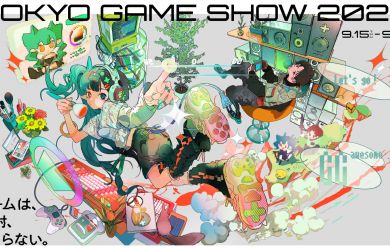
October 8, 2009
Virtual Idols
Japan’s new media sensations blur the line between the real and the imaginary
By Metropolis
Originally published on metropolis.co.jp on October 2009

Meet Yuki Terai. This model, tarento and singer just turned 19, but rattles off her measurements with a practiced ease: 166cm tall, 86cm bust, 59cm waist, 85cm hips. She was born in Chiba. Oh, and she’s also a time traveler from the year 2017.
Terai is a virtual idol, a media personality who isn’t a person at all. As in William Gibson’s sci-fi description of idoru, these stars are quite literally produced. Terai was designed by Kenichi Kutsugi for his manga Libido in 1997, and became a huge success after appearing on his website in three-dimensional, computer-generated form. By 2000, she had released a CD with Avex and starred in a TV commercial with actor Yoshihiko Hakamada. She appeared in four DVDs between 2000 and 2001.
Terai wasn’t the first of her kind; that honor goes to Hori Pro’s Kyoko Date back in 1996. Codenamed “DK-96,” or Digital Kid 1996, Date was brought to life by Visual Science Laboratory, which made use of “full motion capture,” now widely employed in videogame and film production, to give her realistic movements. Date’s first CD single was “Love Communication,” with a music video that showed her walking the streets of Tokyo and New York. This paved the way for a virtual idol boom in the 2000s, with Fuji TV’s involvement in the Virtual Idol Project, CG unit Super Honey Bee and, of course, Terai.
By now, these figures are deeply embedded in the fabric of otaku media. Take, for example, The Idolm@ster, an arcade and console rhythm game released by Namco in 2005. The player takes the role of Producer, choosing one to three idols and trying to win fans by teaching them song and dance routines. The combination of realistic movements and a wide cast of cute characters to control made this a mega hit franchise that continues to this day.
The newest examples of virtual idols are Vocaloids, a term used to describe a synthesizer program developed by Yamaha in 2003, and the characters developed by third parties to run on the program. The user inputs lyrics and pitches, and the program synthesizes them into something like singing. The “voice” differs depending on which character is warbling the pitches.
The most popular Vocaloid is Crypton Future Media’s Miku Hatsune, who sports green pigtails and wields a leek baton. Hatsune debuted in summer 2007, and technologically savvy otaku quickly fell in love with her imperfect tone, which is said to resemble the “non-ability” that contributes to idols’ popularity. Everyone else fell for the character’s design. Fans started making music videos of Hatsune and posting them on Nico Nico Douga, including such innovations as her singing Finnish polka. She began to appear in fan-produced CDs, manga, cosplay outfits and, finally, licensed character merchandise. Such is Hatsune’s popularity that she was a headliner at the anime industry’s Animelo Summer Live concert this year. Her image onscreen and recorded voice constitutes a “live” performance worth an ¥8,500 ticket.
Sure enough, mainstream bands are beginning to learn from the success of their virtual counterparts. The most famous to date is Perfume, a three-girl “techno” unit. The group formed in Hiroshima in 2001, when the members were aged 11-12, and moved to Tokyo a couple of years later. They found some success on the live-house circuit thanks to their unbridled energy, and after uploading their songs onto Nico Nico Douga, the trio gained renown in the virtual world. With their layered and synthesized voices, synchronized movements, and 8-bit accompaniments, Perfume fits right in with robotic and doll-like virtual idols.
The group’s music videos were seen alongside videos of The Idolm@aster girls and Miku, both of which often covered Perfume songs. Even as the band found commercial success with the national recycling campaign anthem, “Polyrhythm” (2007), and shattered records with a No. 1 single on the Oricon charts in July 2008, otaku continued to see them as virtual idols. At the Otaku Awards 2008, Perfume was voted one of the most important phenomena of the year. It seems like these and other “near-future idol” bands are virtually guaranteed to succeed.





